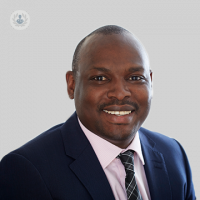Do you know how many eggs you have? All you need to know about ovarian reserve and fertility
Escrito por:Many women are well-aware of their ticking ‘biological clocks’ with regards to their fertility, however, as more women choose to have children at a later stage in their life, more and more couples experience difficulty in conceiving. Although most women do not have problems conceiving, 1 in 6 couples experience problems. Many of these couples will be able to conceive naturally, after receiving medical or surgical treatment, however, some will need added support in the form of IVF with their eggs, or donor eggs. Mr David Ogutu, an expert fertility specialist, discusses fertility and the ovarian reserve.
What is the most important factor for a successful pregnancy?
The single most important factor that results in a successful pregnancy and subsequent birth is the quality of eggs. The measure used to assess an egg’s quality is a woman’s age.
Do women continue to make eggs throughout their lifetime, or are they born with a finite amount of eggs?
Women do not continue to produce new eggs over the years, and are born with a set number for use for the rest of their reproductive life. On average, a female foetus has around 5 million eggs on their ovaries by 20 weeks of pregnancy. During the pregnancy, as the foetus develops in the mother’s womb, the foetus loses more than half of these eggs, and on average, a baby girl is born with approximately 2 million eggs.
Throughout childhood development, a further half of these eggs are lost, and by the time a girl reaches puberty the egg reserve falls to 0.5 to 1 million eggs. All of these eggs are said to be dormant (asleep). At the start of every menstrual cycle, a small amount of immature eggs are woken up from this pool of eggs. In an ultrasound scan these eggs appear as tiny fluid-filled sacs within the ovaries. These are called antral follicles, and on average there are around 5 to 10 in each ovary.

What happens in ovulation?
Follicle stimulating hormone (FSH) is produced by the pituitary gland in the brain, and every month this hormone is released and stimulates one of the follicles in one of the ovaries. This follicle, once stimulated by the FSH will start to develop and will pop mid-cycle releasing the mature egg. This process is called ovulation. The remaining follicles that did not get stimulated that month will die off over the following weeks, and the same process will start again for the next cycle. Hence, over time a woman’s pool of eggs decreases.
When a woman reaches menopause, she will usually have around 1000 immature eggs left in her ovaries.
Of the millions of eggs in a woman’s ovaries, just 400-450 of those will get to ovulate during a woman’s reproductive life and the rest will die off. Generally, the better quality eggs will be released when a woman is younger, and that is why it is easier to get pregnant younger. As a woman gets older, the quantity and quality of eggs declines which is why it will take longer to pregnant and why miscarriage rates due to chromosomally abnormal embryos increases. The chances of chromosomal abnormalities, such as Down’s syndrome also increases.
How can you measure the ovarian reserve?
The follicles within each ovary produce a hormone called Anti- Müllerian Hormone (AMH). The more eggs a woman has in her reserve, the more antral follicles will be woken up, and hence the AMH level will be higher.
In women with a higher than average AMH level, they will be waking up more than 12 antral follicles every month. This is the case in 4 out of 10 women. This phenomenon is called polycystic ovaries (PCO). Most women with PCO do not have fertility problems and go through menopause later than average. However, for some women with PCO, they might not release an egg every month, which can result in either a longer menstrual period, or no period at all. This can also result in higher testosterone levels which can be detected in blood tests, and can cause acne and excessive body hair. This is known as polycystic ovarian syndrome (PCOS).
Therefore, AMH levels indicate egg quantity, but not quality.
How can AMH tests help with fertility?
Regardless of age, AMH testing can benefit a woman or couple:
- Younger women who do not want to start a family yet can gain reassurance that time is on their side.
- Women whose mothers had early menopause can be told their risk of having early menopause.
- Women over the age of 35 years can be told about their remaining ovarian reserve.
It is important to note that AMH testing is just a snapshot of female egg reserve, and is not a guarantee for the future. Those looking to delay motherhood should have AMH retesting over time.
If you would like more information on fertility and AMH testing, make an appointment with Mr David Ogutu.
Photo by Isometrik and Kaldari



